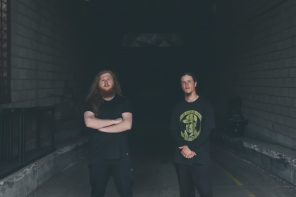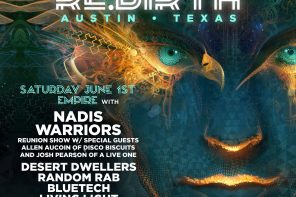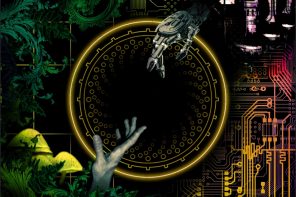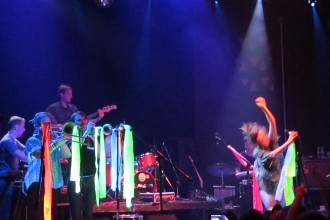Art comes to us in many forms, and here at Lost in Sound we fully appreciate all the bizarre incarnations in which creativity can take shape. While music is our primary focus, we take a special liking to those that can create with the rare medium of words. Lyrical art has been around for eons, from soliloquy to slam poetry to rap. While often overlooked by the populace for a tendency to be abstract and occasionally cliche, some skilled wordsmiths are able to break through, creating a raw commentary on society that music and visual arts only touch upon.
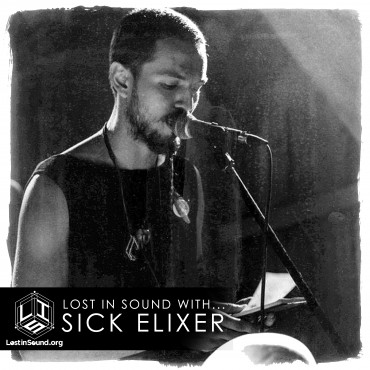 While lyrical poetry and prose have often accompanied music for the sake of performance, there are quite a few varieties of spoken word that contain a rhythm all their own. Beginning with the Beat Poetry movement in the 1950s, these cadence based performance poets have grown increasingly popular over the years, diving into the realms of both comedy and tragedy with biting tongues that tickle the synapses and reflect profoundly on the current state of the world. Comedic verbal acrobats like Bo Burnham and socially focused rhythmic poets such as Climbing PoeTree have gained enough popularity to fill concert halls with ease, establishing the spoken word’s appeal as a modern and entertaining performance art in it’s own right.
While lyrical poetry and prose have often accompanied music for the sake of performance, there are quite a few varieties of spoken word that contain a rhythm all their own. Beginning with the Beat Poetry movement in the 1950s, these cadence based performance poets have grown increasingly popular over the years, diving into the realms of both comedy and tragedy with biting tongues that tickle the synapses and reflect profoundly on the current state of the world. Comedic verbal acrobats like Bo Burnham and socially focused rhythmic poets such as Climbing PoeTree have gained enough popularity to fill concert halls with ease, establishing the spoken word’s appeal as a modern and entertaining performance art in it’s own right.
This installment of “Lost in Sound with…” delves into the mind of one such up-and-coming verse architect by the name of Sick Elixir. Also known by his editorial alter ego here at Lost in Sound, Richard “Ranchsauce” Guerra, Sick Elixir’s prose touches on social and political topics as well as commentary on personal growth. Stylized in a format he’s entitled “Gonzo Poetry” after his literary idol Hunter S. Thompson, his work’s clear goal is to deliver a message, which makes it very well suited for performance. Having made several on stage cameos at last year’s Sonic Bloom festival and Wild Woods festival, among others, Sick Elixir is one of a new population of artists breathing new life into the medium of Spoken Word.
Sick Elixir took some time out of his busy schedule of multi-media world domination to answer a few questions and let us know what he listens to when he gets “Lost in Sound”.
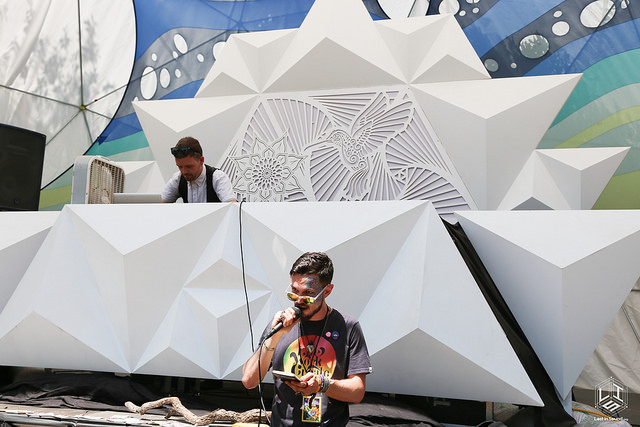
[LIS] You have a way with words in a community that is not well known for its loquaciousness. What led you to choose words as your medium of artistic expression?
[Sick Elixir] *Lolz* It is odd how our community communicates. I suppose without an extensive background in liberal arts and writing, it is easy to limit oneself to internet slang acronyms and to sharing other people’s thoughts on social media. I must admit that I also often communicate in that way, but I remain happily obsessed with stringing words together to express my opinions and to paint a literary picture for others.
As a young boy, I was raised on all the artistic mediums. My father made a point to bring me to art museums, chamber music concerts, and musicals all over Dallas/Fort Worth. I made a lot of visual art as a child, dabbled in musical theatre in high school, watched all the Academy Awards’ Best Picture winners, and was a cellist in orchestra for eight years.
It was my mother who pushed me to focus on handwriting early and to learn to read and spell at a high level. I quickly found myself digesting all of the most exciting and trippy young adult books in the public libraries (“The Lion, the Witch and the Wardrobe”, Roald Dahl, anything with magic and dragons) and eventually learning lessons in humanity (“Moby Dick”, Dostoyevsky, Dickens). It wasn’t until I became hooked on the beauty and darkness of classical and modern poetry, that I gave up my plans to become an orthodontist or film director, and began writing an arts criticism column for the high school paper.
Eventually, I discovered “my voice” in the same way a guitarist realizes that they just wrote their first riff, or a graffiti artist completes their personal tag. I recognized that as I developed my skills in poetry, prose, and news writing, I could effectively connect with a wide range of people and put people onto ideas, events, art, etc. I aspire to inspire others through my gonzo flavored first person accounts of moments and cultural happenings.
You’ve performed on stage alongside some spectacular musicians and at some pretty big events. What’s been your favorite onstage experience thus far?
Thus far, I have mostly performed spoken word as Sick Elixir before or after a musician’s set. I started doing this in Boston during our shows at Wonder Bar, hopping on the mic to close out the evening or wrap up my work as emcee. Last year on festival tour, it was empowering to take that concept to festival stages. However, I must say that performing my poetry on top of some amazing musical production takes the cake. At Fractal Fest and Wild Woods, I had the pleasure of reading while the guys from Radioactive Sandwich laid down the soundtrack.
The experience inspired me to sit down with Josh Weinberg at Berklee College of Music and record 12 of my pieces. I have since been sharing the files with producer friends, asking them to choose a poem and then compose music to go along with it. The idea is to complete an album of spoken word + next level beats, and then play the music in a live setting, where I will then perform the spoken word. Josh Weinberg and Moduloktopus (Wiggz Caro) are collaborating on a new project called Tahabdra, and are currently laying down the music for my poem “The Golden Door of the Future”. I’m stoked on what they come up with and am excited to get other producers involved!
Your poetry is very politically and culturally driven. Tell us about some of the experiences that have shaped your political views.
I was 13 when the attacks on 9/11 happened, it was at that time that I expanded my focus from History to current events. I watched with unease as ignorance of history, religion and culture seemed to exist everywhere, even on broadcast television. I felt like war, violence, greed, hate and all of those negative attitudes and actions had been proven time and time again to not be sustainable or righteous. I remember being inspired politically for the first time by the words a young Barack Obama spoke at the 2004 Democratic National Convention.
I also think the tomfoolery of the Great Recession and the financial collapse really revved me up politically. I was able to watch so many documentaries and read Gonzo pieces by Matt Taibbi that put all of the mess into perspective. The truths behind the betrayal of the American people led me to align with the overarching themes of Occupy Wall Street. I realized that all of the broken elements of the U.S. political system, economy, and democracy would not be fixed until campaign finance reform happened. First Elizabeth Warren, then Bernie Sanders became leaders that I could understand and trust.
You’ve had quite the variety of contributing roles within the music industry, from publicity to management to poetry accompaniment to journalism. What’s your favorite way to get ‘Lost in Sound’?
As I try to answer this question, I am searching my experience to moments when I truly embodied being ‘Lost in Sound’…It’s holding my pen and Moleskine, skin and mind buzzing, Nikon around my neck and iPhone in my pocket with the camera app open. The sounds of a raucous band playing on the stage in front of me merge with the shouts, laughs and conversations of the people surrounding. I turn around and can see the flashing lights of another stage off in the distance, and can almost feel the reverberations of bass laid down by a psychedelic producer/dj. Paint brushed on easels and colliding LED hoops and swinging hammocks and accurate tarot readings and tearful hugs and spinning parasols and video drones above…they all combine and fuel my own creative mind as it works to understand what it all means.
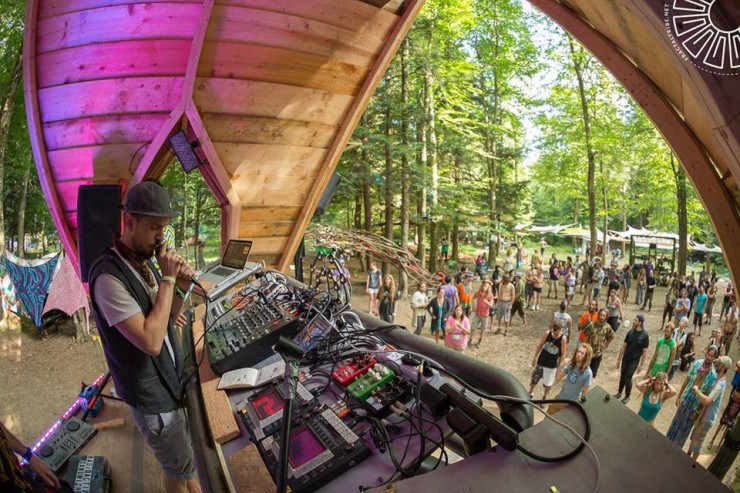
You’ve recently relocated from New England back to your hometown in Austin, TX. How do you compare the cultural climate in your two ‘Hometowns’?
Boston definitely grapples with its puritanical history, with less real estate options for live music business.In Boston, you often have to hop around from neighborhood to neighborhood to catch a show or be a part of a non-mainstream arts event. There are a few spots with a couple venues near each other, but there isn’t really any one concentrated area for shows. During the rise of modern festivals and EDM popularized, many of us found a way to throw shows in bars and underground spaces. Although, it really did open the city up to a new wave of innovative artists and musicians, it remains an uphill battle against sanctions and expensive permits. I must note that there is a great dancehall scene in Cambridge centered around Together Festival, and there are more events happening at Wonder Bar then ever.
“Keep Austin Weird” has been the motto for a long time in Austin. Weirdos, along with creative public spaces and events are the mainstream in Austin. They are supported by all kinds of successful non-profits and even the city itself. Thus, there is a growing climate of kava bars, eateries centered around dietary preferences, backyard coffeehouses, and co-creative pop-ups–all with music everywhere! Not to mention the Boston Calling style festival events happen multiple times a month in this city, and for pretty much every genre imaginable. While Boston struggles with being a college town, because so many of the residents only stick around for a few years, Austin’s music scene doesn’t rely on the UT students to be.
Your work with Lost in Sound has made you a staple character at transformational festivals and music events all over the country. What is the best event overall that you have attended and why?
Rothbury 2009 changed my life and shaped my perceptions of live music and festival culture. For the week that I was there with the early Lost in Sound/Use Your Head rage crew, it was like being in one of those zones that transcends time and space. The magic of those grounds and Sherwood and Ranch Arena was still fresh then and the Forest had not yet gone full “Electric.” It was a merging of old and new worlds. With The Dead (minus Jerry) headlining on 4th of July in front of 30,000 and the closest thing to a classic Shakedown Street that I had ever seen, I felt as if I was experiencing what it was like to see the band before the hiatus. All of my new favorite live bands (STS9, The Disco Biscuits, Lotus, Yonder Mountain) filled the bill along with favorites from my pre-festival days (Bob Dylan, Broken Social Scene, Willie Nelson, Matisyahu, Damian Marley). It was the late night sets though, by Shpongle, EOTO and the then new Pretty Lights, that I believe marked the beginning of a new era in festival culture. One that would introduce jamband fanatics and children of hippies to bass music and psychedelic dance culture.
I want to also note that 7 long years later, the “best” overall event that I have experienced and been transformed by is Unifier Festival. A truly inclusive tribe creating together consciously while spreading healing beauty and bliss. Balanced and well-produced, it has shown me the power of a transformational gathering.
Is there a message you’re hoping hope to convey with your poetry and written work overall?
I suppose I am hoping to shout out loud about the harmonious integration, positivity and light work that is happening on our planet and on behalf of our species constantly, while cluing people in on any pitfalls and evil bullshit that may distract us. Imploring people to “Use Your Head.”
You’ve been an advocate of ‘Gonzo’ style journalism for a while now. Is being present and fully immersing yourself in experiences essential for a writer in the same way it is for other creatives?
I’d have to say that it is definitely MORE important, because while musicians and visual artists are able to derive positive elements and ideas from being present in their experience, there is no requirement for them to include any of their reality in their art if they don’t want to. Their art can “say something” or it can be completely abstract and confusing too. It’s a different kind of truth I think.
It is a little different for writers, poets and especially Gonzo journalists hoping to convey some direct truth about the world around them or the experience they are having. Words and names are the building blocks, palette and synth patches that make up this kind of art that we create. All of which have meanings or context that must be considered when we use them. It’s just the way language has worked for the human race thus far! If a reporter or writer wants to be effective or understood by their readers, there is only so much confusion or abstraction that can be tolerated.
In the world today, traditional journalists in newspapers and on 24-hour networks tend to write and talk about subjects and events either like tourists on safari, or by shouting their opinions back and forth in some great ongoing debate about anything and everything. Additionally, the world and it’s happenings are constantly being posted about online by click-bait prospectors on blogs, on Gawker, on Buzzfeed and the like. These elements of journalism are important and serve purposes, the first being a noble one and the second being to serve as a stark contrast. I will quote Hunter S. Thompson here. He said that “Objective journalism is one of the main reasons American politics has been allowed to be so corrupt for so long.” and that “Absolute truth is a very rare and dangerous commodity in the context of professional journalism.”
I believe that the most effective way for a non-fiction writer or a journalist to tell the story or convey the opinion is through the Gonzo-style. To be a part of the experience and the story, as a real-time character who’s heart and soul is at play. Thompson described it as such: “The writer must be a participant in the scene… like a film director who writes his own scripts, does his own camera work, and somehow manages to film himself in action, as the protagonist or at least the main character.” That kind of writing catches the attention of anyone. Accurate and sharp, yet raw and personal. What is happening now, what we care about, what moves us….these are the things we have a duty to disseminate and present for those who need to know today and in the future.
TRACK LIST:
1. Digtal Vagabond – “Live at COSM”
2. Tom Misch – “The Journey” on Soulection
3. Bonobo – “Essential Mix”
4. Detox Unit – “LostinSound.org Exclusive Mix”
5. Space Jesus – “HMU ft. Clay Parnell & Rory ‘Sweet Boy’ Dolan”
6. Sixis – “Open Horizon” on Street Ritual V/A Global Glitch Vol II
7. Chance the Rapper – “Summer Friends”
8. Jaime XX – “Essential Mix”
9. Schlang – “The Observer” on LostinSound.org Spring 2015 V/A Compilation 004
Find out more about Sick Elixir here:
Sick Elixir on Twitter // Sick Elixir Online //Sick Elixir on Facebook


